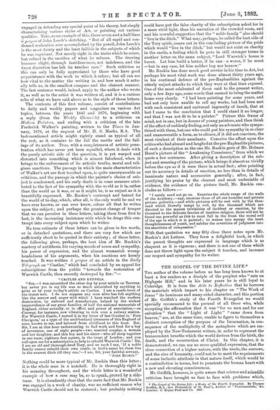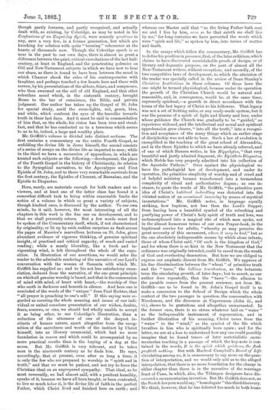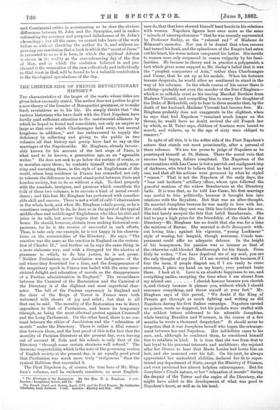THE GOSPEL OF THE DIVINE LIFE.*
THE author of the volume before us has long been known to at least a few readers as a disciple of the prophet who " sate on Highgate Hill," and in his later years he is still loyal to Coleridge. It is from the Aids to Reflection that he borrows the materials which impart to his chapter on " The Work of Jesus " its luminous and many-sided character, and this portion of Mr. Griffith's study of the Fourth Evangelist we would specially recommend to the perusal of all those who, while accepting the affirmation that it was "for us men and for our salvation " that the " Light of Light" " came down from heaven," are, at the same time, unable to figure to themselves a distinct conception of the purpose of the Incarnation, in con- sequence of the multiplicity of the metaphors which are em- ployed by the New-Testament writers, in order to represent the transcendent benefits which the world derives from the birth, the death, and the resurrection of Christ. In this chapter, it is demonstrated, we can use no more qualified expression, that the close connection of a higher nature, with the needs, the sorrows, and the sins of humanity, could not be to meet the requirements of some inelastic attribute in that nature itself, which would be a contradiction in terms, but to penetrate the human heart with a new and elevating consciousness.
Mr. Griffith, however, is quite aware that science and scientific criticism have brought us face to face with problems which,
• The Gospel of the Divine Life a Study of the Fourth Evangelist. By Thomas Griffith, M.A., late Prebendary of St. Paul's, Author of " Fundamentals," ace. London : C. Kegan Paid and Co. 1881.
though partly foreseen, and partly recognised, and actually dealt with, as existing, by Coleridge, as may be noted in his Confessions of an Enquiring Spirit, were scarcely questions to any, save a very few, in a former generation, but which are knocking for solution with quite "burning" vehemence at the hearts of thousands now. Though the Coleridge epoch is so near in the past. to our own days, there is almost as great a difference between the quiet, critical exercitations of the last half- century, at least in England, and the penetrating polemics on Old and New-Testament subjects in which we have now to bear our share, as there is found to have been between the mood in which Chaucer shook the sides of his contemporaries with daughter, and perhaps touched a few hearts here and there with sorrow, by his presentations of the abbots, friars, and sompnonrs, who then swarmed on the soil of old England, and that other relentless mood which, in the sixteenth century, brought Rome to the bar of conscience, the Bible, and private judgment. Our author has taken up the Gospel of St. John for special study, amid the cross-lights, red, green, blue, and white, which confront the eyes of the traveller towards truth in these last days. And it must be said in commendation of him that, on the whole, his vision has been true and stead- fast, and that he has conducted us to a terminus which seems to us to be, indeed, a large and wealthy place.
Mr. Griffith's volume is divided into distinct sections. The first contains a commentary on the entire Fourth Gospel, as unfolding the divine life in Jesus himself, the second consists of a series of essays on the divine life as imparted to men; while in the third we have a succession of appendices, in which are treated such subjects as the following,—development, the place of the Fourth Gospel in the history of Christianity, its relation to the Synoptical narratives, to the Apocalypse and First Epistle of St. John, and to those very remarkable survivals from the first century, the Epistles of Clement, of Barnabas, and the Epistle to Diognetus.
Here, surely, are materials enough for both readers and re- viewers, and at least one of the latter class has found it a somewhat difficult task to bring within reasonable limits the notice of a volume in which so great a variety of subjects, though kindred ones, is discussed by the author. To our own minds, be it said, however, the most interesting of all the chapters in this work is the fine one on development, and to that we shall presently return. But a few words must first be spoken of the Commentary itself, which, if not characterised by originality, or lit up by such sudden surprises as flash across the pages of Maurice's marvellous lectures on St. John, gives abundant evidence of vigorous thinking, of genuine spiritual insight, of practised and critical sagacity, of much and varied reading; while a manly liberality, like a fresh and in- vigorating wind, is felt throughout the whole of the expo- sition. In illustration of our assertions, we would refer the reader to the admirable rendering of the narrative of our Lord's conversation with the woman of Samaria with which Mr. Griffith has supplied us ; and to his not less satisfactory enun- ciation, deduced from the narrative, of the one great principle on which all genuine worship is based, and that is the communion of mind with mind, of heart with heart,—the worship of One who seeth in darkness and heareth in silence. And here one is reminded of the words of the " unique " Jean Paul Richter, that " all prayer is preaching to one's self." If this saying were re- garded as covering the whole meaning and issues of our indi- vidual or united conscious presentation of our wishes, doubts, fears, sorrows, or sins, we should feel wholly unable to accept it as being other, to use Coleridge's illustration, than a reduction of the utterance of one of the deepest in- stincts of human nature, apart altogether from the recog- nition of the sacredness and worth of the instinct by Christ himself, into an illusory ceremonial, which had no more foundation in reason and which could be accompanied by no more practical results than is the baying of a dog at the moon. But Mr. Griffith is very tolerant, and he takes man in the nineteenth century as he finds him. He says, accordingly, that at present, even after so long a time, it is only the few who are prepared to worship in "spirit and in truth," and that we must be patient, and not try to force the Christian ideal on an unprepared sympathy. That ideal, as be most reverently, we had almost said, with a penitent humility, speaks of it, because we have all been taught, or been contented, to live so much below it, is the divine life of faith in the perfect Father, which Christ lived and finished here on earth ; and
whereas our Master said that "as the living Father hath sent me and I live by him, even so he that eateth me shall live by me," for long centuries we have perverted the words which were "spirit and life," as spoken by him, into terms of matter and death.
In the essays which follow the commentary, Mr. Griffith has to define his position in presence, first, of the later criticism, which claims to have discovered unmistakable proofs of design, or of literary and dogmatic purpose, on the part of almost all the New-Testament writers, without exception; and secondly, of the two competitive laws of development, to which the attention of the reader was specially called in the review of Dean Stanley's Christian Institutions in these columns. Of these laws the one might be termed physiological, because under its operation the growth of the Christian Church would be natural and reasonable, and, in consequence, would be, at the same time, supremely spiritual,—a growth in direct accordance with the terms of the last legacy of Christ to his followers. That legacy was not a set of fretting rules, or any ready-made system, but it was the promise of a spirit of light and liberty and love, under whose guidance the Church was gradually to be "guided," as experience widened, and the intellectual and moral and spiritual apprehension grew clearer, " into all the truth," into a recogni- tion and acceptance of the many things which an earlier stage of discipleship was not able to bear. Such a law of evolution is exemplified in the teaching of the great school of Alexandria, and in the three Epistles to which we have already referred, and of one of which Bunsen writes, in his Hippolytus," that very beautiful and justly admired fragment, the Epistle to Diognetus, which Hefele has very properly admitted into his collection of the Apostolic Fathers." Over against the physiological we have the pathologiCal law of development, and under its operation, the primitive simplicity of worship and of creed and of helpful ministry became transformed into a tremendous complexity of ritual and authoritative dogma ; as one in- stance, to quote the words of Mr. Griffith, " the primitive pure idea of Christ's habitual indwelling was distorted into the vitiated notion of an occasional incoming by means of mystical incantations." Mr. Griffith notes, in language equally striking, how baptism, not less than the Lord's Supper, from having been a beautiful symbol of the refreshing and purifying power of Christ's holy spirit of truth and love, was metamorphosed into a magical rite of which men spoke, not in the almost humorous terms of our own Prayer-book, in the baptismal service for adults, " whereby ye may perceive the great necessity of this sacrament, where it may be had," but as the one absolutely indispensable means by which alone infants, those of whom Christ said, " Of such is the kingdom of God," and for whom there is no hint in the New Testament that the ordinance was originally intended, could be saved from the wrath of God and everlasting damnation. But here we are obliged to express our emphatic dissent from Mr. Griffith. We approve of his fine discrimination between the " wheat " of primitive truth and the " tares," the lolliuni temulenturn, as the botanists term the simulating growth, of later days ; but to assert, as our author does repeatedly, that the " tares "—the allusion to the parable comes from the present reviewer, not from Mr. Griffith—are to be found in St. John's Gospel itself is to make a concession to the School of Design which the whole context of the two passages in question, the conversation with Nicodemus, and the discourse at Capernanm (John iii., and vi.), shows to be gratuitous and altogether unwarranted. In the former case, there is no stress whatever laid on " water " as the indispensable instrument of regeneration, and in further illustration of his meaning, Christ turns from the " water " to the " wind," as the symbol of the life which breathes in him who is spiritually born again ; and for the latter, we are at a loss to understand bow any one could possibly imagine that he found traces of later materialistic sacra- mentarian teaching in a passage of which the key-note is con- tained in the words, It is the spirit which quickens, the flesh, profiteth, nothing. But with Macleod Campbell's Bread of Life circulating among us, it is unnecessary to say more on the ques- tion of interpretation, and we would only add as to the alleged interpolation, that there is no more foundation for the charge in either chapter than there is in the narrative of the marriage feast of Cana, in which, also, the Tiibingen designers have dis- covered a sacramentarian invention. But Mr. Griffith does not, as the Scotch lawyers would say, " homologate " this third discovery. We think, however, that he has deferred too much to both home
and Continental critics in accentuating as he does the obvious differences between St. John and the Synoptics, and in under- estimating the accuracy and purposed definiteness of St. John's chronology ; but all the same, we cannot take leave of the work before us without thanking the author for it, and without ex- pressing our conviction that a book in which the " secret of Jesus" is presented to us as it is here, in which the spiritual Advent is shown in its reality as the ever-advancing day of the Son of Man, and in which the evolution believed in and pro- claimed is the restoration of the race collectively and individually to filial trust in God, will be found to be a valuable contribution to the theological speculations of the day.
















































 Previous page
Previous page